#narration
Text
Essential genres of YouTube narrators:
Dude who sounds like off-brand Grover from Sesame Street and thinks "hello, everybody" is a catchphrase
Person with a conspicuous SoCal accent trying and failing to emulate the sterile cadence of a Nintendo Direct presentation
Clearly aiming for sentimental sincerity; mostly succeeds in sounding like they're struggling not to cry
Really excitable guy who's always shouting
Earnest Brit who pauses both before and after all of their puns to make sure you got it
Blatant Hbomberguy wannabe
The actual Hbomberguy
2K notes
·
View notes
Text
I was trying to solve current societal issues (racism, homophobia, etc.), but I was failing. Danny Gonzalez narrated everything in the form of a musical the entire time.
403 notes
·
View notes
Text
I don't think we ever actually posted the trailer for this here! SOUND ON for that good good voice acting!
You’re on a path in the woods. And at the end of that path is a cabin. And in the basement of that cabin is a Princess. (Nichole Goodnight)
You’re here to slay her. If you don’t, it will mean the end of the world.
At least, that’s what the Narrator (Jonathan Sims) tells you. But you don’t have to listen. Sure, you can do as he says, killing the entity in the basement, whether she’s a Princess or... something else. Or you can try to find some other way out of the eternity of choices and twisting paths you and the “Princess” have found yourselves in. You might find, however, that some decisions will reshape the world in ways that only make things worse...
Is the world that tasked you to save it even worth saving?
We've got a demo on Steam and itch that covers the first chapter of the game, and it should run pretty well on most Mac, Windows, and Linux machines! There's achievements in the Steam version too, and it usually takes a little over an hour to get them all!
If fully voice acted visual novels that sit between The Stanley Parable and cosmic horror sound your jam, please check it out, and if you'd like to be notified when it releases, you can wishlist it on Steam.
#slay the princess#horror aesthetic#jonathan sims#dont forgot to wishlist it to feed the mighty algorithm#all i want to do is never have to post again and with your help and wishlists we can make that dream come true#tma#tma adjacent#the magnus archives#magnus archives#abby howard#nichole goodnight#choices matter#the stanley parable#narration#tsp narrator
2K notes
·
View notes
Text
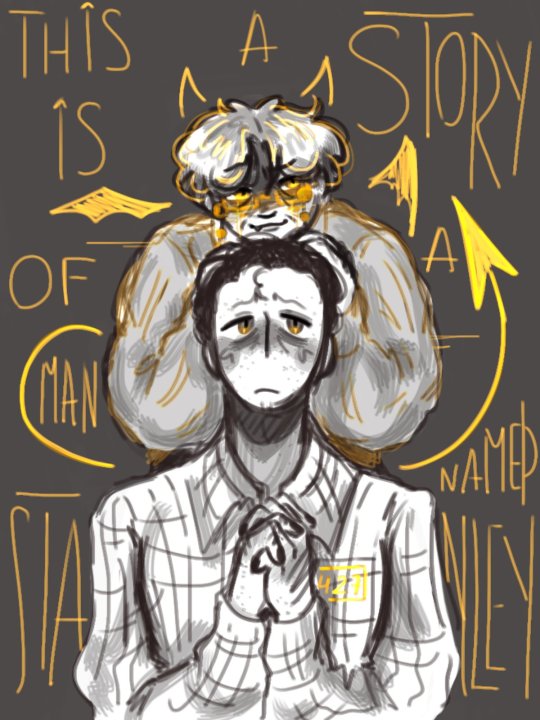
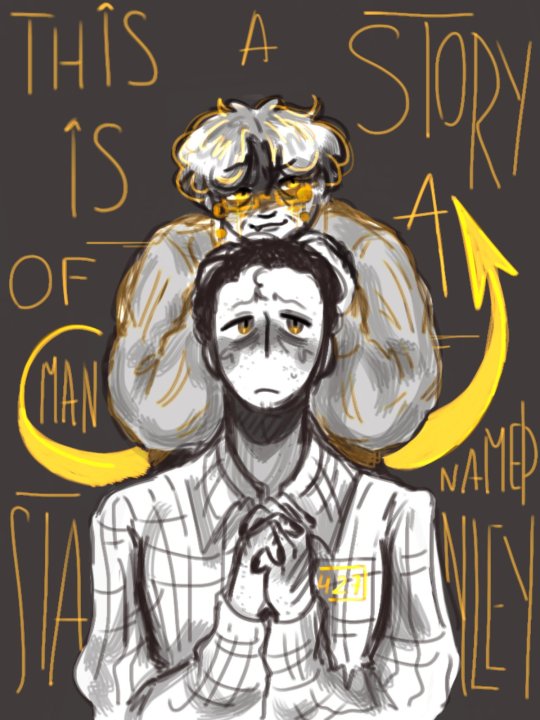
This is a story
#tsp#the stanley parable#art#tspud art#tsp fanart#tspud narrator#tspud stanley#stanarrator#old men#narration
131 notes
·
View notes
Note
The Stanley Parable.
There is no Game.
Dude Stop.
Slay The Princess.
The Corridor.
So many different colors but the idiots all act the same.
This is about the narrators, isn't it.
ALSO POST THIS ON YOUR OWN DAMN BLOG.
#ask#the stanley parable#the corridor#slay the princess#there is no game#dude stop#tsp narrator#unreliable narrators#narrative#narration#asks
78 notes
·
View notes
Text
ITS MY BIRTH OF DAYYYYYYY

i will enjoy the day
#tsp#the stanley parable#tspud#tsp narrator#stanley parable#art#the stanley parable narrator#tsp fanart#tspud art#tsp stanley#birthday#ask narrator#my narrator#narration#the narrator tsp#tsp the narrator#narrator#narratorverse#narrative#narrator design#the narrator fanart#the space narrator 🌌#space narrator#stanley tsp#tsp art#tsp fandom#tsp ultra deluxe#the stanley parable ultra deluxe#the stanley parable fanart#tsp artist
125 notes
·
View notes
Note
One of the most appealing things about the Animorphs series to me is that we have multiple narrators all with different biases and morals which can really affect how they perceive a situation and other people. I was wondering which book or books would you like to see told by a different Animorph, and why? Personally, I'd love to see one of the original David trilogy told from Cassie's point of view.
Ooh, I'd feel that. Cassie's good with people but also sure of herself in a way that Jake and Marco aren't, so I'd especially love to see her go through the process of "uuummm, I think we fucked up by recruiting this kid."
But I want Rachel to narrate #53. Yes, Jake plays an important role because it's all about the Animorphs reluctantly allying with Tom's yeerk, but I'd much rather see Rachel's take on the endgame. Between her being absent from both mini-teams in #50 and #51, her being out-of-character in #52, and her dreaming throughout #47, it feels like she's barely present in those last few books. If she's narrating #53, then some things would change — she, not Jake, would have to be the random single Animorph that the taxxon rebellion scoops up — but a lot of things wouldn't have to change.
There's so much in that book, from Naomi being a jerk to Jake going off the rails to her impending death to her planning Tom's death, that I want her perspective on. That single chapter at the start of #54 is powerful, but it's also three pages long. I want a book of her perspective on the endgame.
152 notes
·
View notes
Text
AND DON'T EVEN GET ME STARTED on writing erotic povs of 'problematic content.'
I'm sorry, but if you write exclusively as a soulless narrator with politically correct and culturally moral opinions, your writing is boring. Give your narrator some spice! Yes, you can write murder erotically. Yes, you can write a cute wholesome scene like its the most disgusting thing in the universe from the narrator's perspective. You can write a mean narrator that pokes fun at the reader. You can write a weirdly maternal narrator that holds your readers hand and is meant to come off as mildly patronizing. You can write a sarcastic narrator, or an extremely blunt narrator. You can even write a narrator that is some insane political extremist. It's fiction. Creative writing. So be creative.
Write characters who's thought processes and actions are awful and make them look appealing. Write scenes that are relatively normal and make them look scary or strange. Please just write with some shred of creativity.
I need to go to the fucking library and read some good classics before I go fucking crazy. Y'all do not know how to just let go and enjoy the artistic process and it Shows. Everything is a reflection of you as a person. You always feel watched and judged. In the age of the internet, I guess it's understandable. (D'ya see what I did there, sympathetic to a problematic character-- in this case, the audience that wants to kill art for its wild spirit?)
Anyway here's a writing prompt:
Write a narrator that isn't Your Social Face. Bonus points if the narrator is telling the story very differently from how the characters or scenery do. Put your whole pussy into it bro.
And remember. The narrator is a character, too. And that character does not have to be You.
#narration#writing prompt#anti anti#anti purity culture#anti puritan#freedom of expression#art#social commentary#im sorry but so much stuff is becoming soulless now it scares me#morality police#start thinking creatively -quoting dhmis#disregard 'green is not a creative colour' this is the thing i am against#rant#scathing criticism#literature#making art#waxing poetic#toward the end there#writing tips#do whatever you want#forever#be creative#virtue signaling#american culture#internet culture#shaking you#please for the love of god stop being scared of art embrace the chaos adore the craft
72 notes
·
View notes
Text
Another WH40K speech by Christopher Tester (I hate how tumblr won't let me post more than one video per post).
Roboute Guilloman speaking to Angron in Betrayer by Aaron Dembski-Bowden (I think)
#warhammer 40000#wh40k#roboute guilliman#angron#primarch#betrayer#Aaron Dembski-Bowden#science fiction#scifi#voice acting#narration#science fantasy#grimdark
384 notes
·
View notes
Text
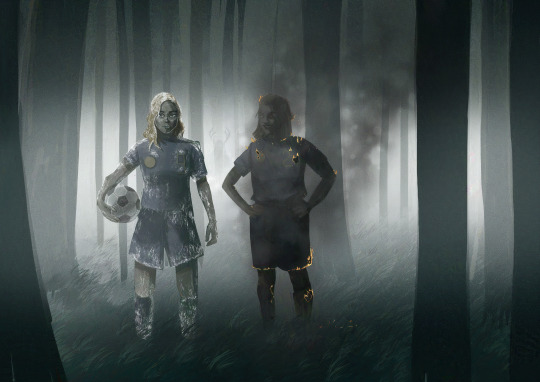
And it waited, and waited... to befriend whoever arrived.
#myart#fanart#yellowjackets fanart#yellowjackets quotes#yellowjackets#Jackie Taylor#Dead Jackie Taylor#Ghost Jackie#Ghost Jackie Taylor#Ghost Laura Lee#Dead Laura Lee#Dead Yellowjackets#The wilderness Yellowjackets#The wilderness is haunted#and it waited and waited to befriend whoever arrived#yellowjackets season 2 trailer#narration#Jackie Taylor Fanart#Laura Lee Fanart#The Wilderness Fanart
82 notes
·
View notes
Text
"He ... grabbed my hair in a way that made me understand the difference between rugby and football".
Its figurative intended means of compelling comprehension of all three implied sports (rugby being what American football diverged from, what the rest of the world calls football A.K.A. soccer, and American football): He made me want to be with him when he's in his world and want him with me when I'm in mine ... to always live in a realm where our two worlds meet.







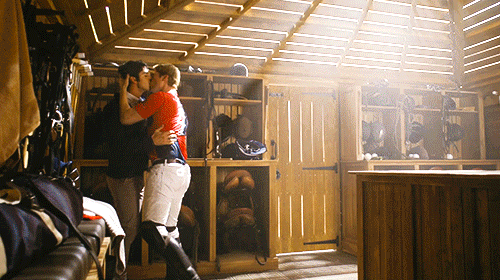








Its literal intended means of compelling comprehension of all three implied sports (rugby being what American football diverged from, what the rest of the world calls football A.K.A. soccer, and American football and knowing that Nick has played "Conor Masters," "Henry Fox," and "Jeff"):
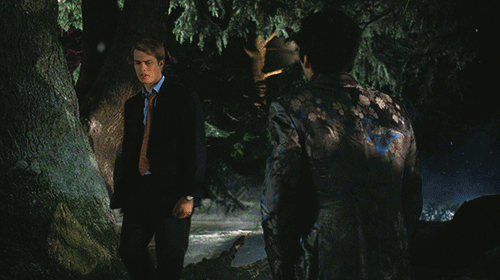




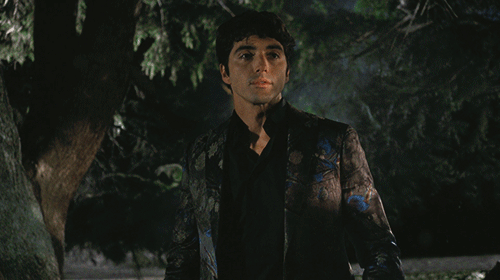
#red white and royal blue#rwarb#rwrb#firstprince#first prince#alex claremont-diaz#nicholas galitzine#prince henry fox-mountchristen-windsor#narration#nora holleran#percy 'pez' okonjo#percy okonjo#handsome devil#conor masters#oscar diaz#bottoms movie#jeff#tim#alex x henry#alexxhenry#alexhenry#henry x alex#henryxalex#henryalex#gif
57 notes
·
View notes
Text
My cousin had a nightmare that he was standing on a tall building looking over an apocalyptic destroyed cityscape and a gruff narrator guy said, “Ever since the lesbians were eradicated 50 years ago...” and then he woke up.
#dream#text#March 31st 2023#cousin#apocalypse#apocalypse tw#narration#lesbian#homophobia tw#hate crime tw#lesbophobia tw#nightmare#horror#death tw#violence tw
2K notes
·
View notes
Text




Robert Redford – The Language And Music Of The Wolves
I'm not above exploring rabbit holes and this was a good one.
Natural History magazine got a very much in his prime Robert Redford to narrate side A of a record of field recording of Wolf calls.
I'm into it.
Get it from my Google Drive HERE
138 notes
·
View notes
Note
1. I come up with a story idea
2. I brain dump
3. I attempt to outline (still not fully knowing the plot)
4. Somehow there’s a plot now
5. I now have lost the ability to write
It’s like I can’t write episodic pieces or something and the idea of attempting a novel just makes me think of all the tedious and boring scenes I’ll have to write to lace together the parts I actually want to write. So I never end up actually starting a novel, just outlining. Loving the idea of the story but my passion is sucked at executing the in between moments.
I don’t know what to do Betts. Any advice?
i would just stop writing scenes.
for some reason contemporary publishing, being so intertwined with film for the purpose of adaptation, has emphasized the idea that a novel is a sequence of scenes. but that's not true. a script offers a sequence of scenes, and that's only because it eventually becomes a visual medium. but novels offer narration. that's all they ever have to be. you have a narrator. the narrator tells us the story. discrete scene construction may be beneficial for some novels, but if you don't want to write them, you shouldn't.
if you want to get out of your head about scene crafting and direct discourse, read a biography. pay attention to how it constructs a narrative without any of the tools we have for fiction. in a biography, all the biographer has is facts, and they must convey those facts in such a way as to construct a story out of it. read through a certain lens, biography really sheds a new light on fiction.
and since 4 is the item that seems to block you, one activity you can try is monologuing. instead of writing the story, visualize your main character sitting down across from you and telling you, out loud, what their story is. that frees you from a lot of tedium, because when people speak, they summarize, they jump around in time and subject, they ruminate and speculate. and most importantly, they're probably not going to bother telling you about all those things you're not interested in writing.
free yourself from the shackles of scene. embrace the monologue.
74 notes
·
View notes
Photo

Tableskills: The Proactive DM Voice
One of the most fundamental lesions I learned over the course of becoming a great DM was that it was my job to push the story forward, not my players. When I was younger I was terrified of taking any agency upon myself for fear of railroading my group, thinking that my job was merely to read out prepared text and design a playground for my players to explore as they saw fit. Needless to say, no matter how much planning i did or how big I made my campaign world it never made my party any more energized, instead bleeding out their attention until they became listless and the group/campaign dissolved.
Once I made the change to DM driven play, things changed almost instantly. My once distracted players became excited collaborators, looking to steer the runaway engine that was my narrative. Where as before they were directionless, having infinite shallow options, they were now focused on the road ahead of them, trying to dodge upcoming hurdles while reacting to the unexpected ones.
This change took some getting used to, but became most evident in how I narrated my games, cutting down on extraneous calls for rolls, chaining together scenes until a big finale at the end of the session, using my infinite power as narrator to push receptive players into interesting situations that progressed both the story and their character arc. Over time I began to think of these changes and a bunch of others as “proactive DM voice”, a skill that I think players and dungeonmaters alike could benefit from learning.
Lets look at an example, lifted from one of the very first modules I ever ran: The party stands at the edge of a tremendously large fissure, and has to lower themselves a hundred or more feet down to a ledge where they’ll be ambushed by direrats. You could run this in a rules literal sense: reading out the prepared text then waiting for the party to come up with a solution, likely dallying as they ask questions. Have them make athletics checks to descend the ropes, risk the possibility of one of them dying before the adventure ever begins. Then you do it two or three more times as they leapfrog down the side of the canyon, wasting what was perhaps half an hour of session time before you even got to any of the fun stuff.
Or you could get proactive about it:
Securing your ropes as best you can, you belay over the side of the fissure, descending down in a measured, careful pace aiming for the most stable looking outcrop of rock, still a hundred or so feet above the canyon’s base. A few minutes and about two thirds of the way through your decent [least athletic PC] looks like they’re struggling, their hands are coated in sweat and they can feel unfamiliar muscles burning in complaint. I need [PC] to make me an athletics check
Rather than waiting for the players and the dice to make a story for me, I took the extra step in my prep time to think of something interesting that might happen while they’re venturing through this section of the map. I specifically designed things so that happenstance wouldn’t kill off one of my heroes, but they might end up damaged and in a perilous situation should the fates not favour them that particular moment.
Likewise, this planning has let me prepare a number of different angles that I could use to prepare the next scene: with an injured player ambushed by multiple rats while their allies dangle a few rounds away or with the party saving their friend and descending together, too much of a threat for the rats to tackle all at once, leading them to stalk the party through future encounters.
This is already getting a bit long, but for those interested in more ways you can adopt a proactive DM voice, I’ll give more examples under the cut
A lot of people talk about “the Mercer effect” new people getting into d&d and begin disappointed that the group they’re playing with aren't like critical role. A lot of creators have talked about how to combat the Mercer effect, but regardless of props or budget, I think the greatest difference between your average d&d table and what you see on shows like Critical role, Adventure Zone, or Dimension 20 is the fact that in those streamed games EVERYONE at the table is using a proactive voice, where as it seems to be a skill that most players and dms never pick up on.
Think about it this way, nearly every streaming show is made up of professional entertainers: Voice actors, comedians, people who understand that time is a finite resource and a lack of momentum can kill their performance. That’s why listening to them play is such a treat, everything they say or do is designed to cut down on dithering and give the greatest comedic or dramatic punch in the shortest amount of time.
You start doing the same when you start using a proactive voice at your table, leaving all the unfun number crunching and arbitrary restrictions aside in favour of telling jokes or modulating the dramatic tension, a habit that your party will pick up over time as you maintain it, which will lead to snappier play and more getting done in a single session.
Momentum is key: you always want to be pressing forward towards the meat of your session, towards the next fun npc or dramatic setpiece, and as such you need to give your party the idea that they’re rolling towards a destination. The trick is that after a few plot relevant bits of setup, this destination is almost always a bad one, and if the party doesn’t act on the opportunities you’ve given them, they’re they’re going to end up hurdling towards disaster.
After your party has had their fun ask “ Is there anything you want to do before____?” rather than “ is there anything you want to do?” This gives your party a sense of urgency and forces them to act on their priorities, rather than waiting for them to decide and letting all the tension bleed out.
Be Obvious: you want players to know who and what within a scene is a means for gaining forward narrative progress, so whenever you narrate, be sure to add a liberal dose of scene hooks in with your background description.
The reason that players dither is because they’re not sure what the expectations for a scene are or what they can do: Try to end every one of your descriptions with a prompt for action from your players, restating the problem they’re facing, a few options that they might use to solve it, a reminder of what might happen if they fail. This also helps get past some players who’ve been trained by anxiety bad dms to expect a trap everywhere.
When in doubt, cut it out: unless you have interesting material prepared for a scene, it’s a good idea to skip over a length of time and get to the next bit of content. There’s no reason to detail a party’s night of sleep in the inn after the first night, nor days of travel that aren't particularly dangerous or exceptional. Move them forward unless you feel like one of your players wants to use their downtime as a backdrop for RP
Just let them do it: One of the quickest ways to speed up your game and get things flowing is to cut out extraneous rolls: if your party figures out who the mystery killer is or identifies the type of monster the villagers only saw a hint of, don’t have them roll to see if their characters figured it out. The same goes for solving a puzzle, or correctly suspecting something might be trapped. Instead give them a gold star for being clever little goblins and move on, rather than locking crucial plot development behind a dc. I take any excuse I can to GIVE my party information, relating it to their character backstory or their time spent in a certain region. Not only does it make things faster, it makes them more immersed.
They need to be allowed to mess up: When you cut down on extranious rolls, it means those left behind are important, and need to have consequences. The same goes for the party’s decisions, which need to have real and lasting consequences (good or bad). The first time the party realizes they dropped a plot hook and someone they knew suffered for it, they’ll suddenly understand their responsibility to the world they’re adventuring in and the story they’re a part of.
Give your party regular breaks: While it’s important to maintain a steady momentum, sometimes it’s a good idea to let your party wander a bit, especially if you’re about to head into a longer section of action like a dungeon delve or a mystery. Give them an idea when this time will end (a crowning event at a festival, the king’s courier will get back to them in about three days, bad weather rolling in) and then ask if there’s a special way they’d like to spend their time. This designated space to goof off or go on tangents is actually the best way to get stuff out of your more RP shy players, as they’re often self conscious about taking the spotlight away from others.
I hope this gives you what you need to start making the switch over to proactive Dm voice, but if you want more inspiration pay attention to some liveplay artists, especially those who know they’ve got a limited amount of time on camera to get things done. Imitation is not only the sincerest form of flattery, it’s also one of the best ways to improve your skills.
#tableskills#dm tips#DM advice#DM tools#dm toolbox#narration#voice acting#critical role#dimension 20#taz#Dungeons and Dragons#dnd#dm starterpack
838 notes
·
View notes
Text
youtube
Solar Opposites Valentine's Day Special | Dan Stevens Reads Tervo Love Scene
#solar opposites#solar opposites valentine's day special#korvo#terry#tervo#dan stevens#narration#voicework#hulu#youtube
23 notes
·
View notes